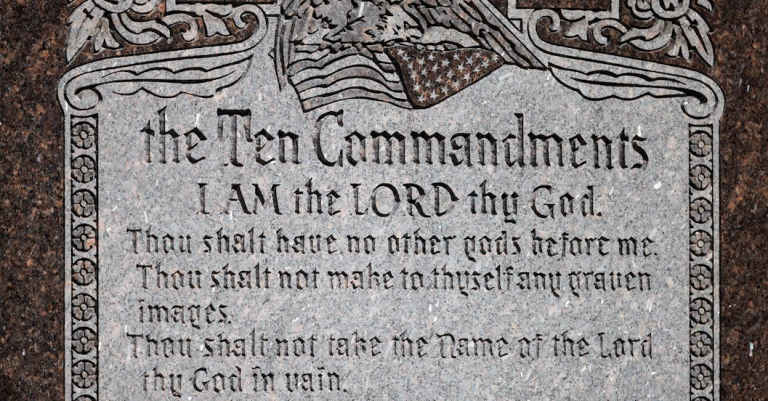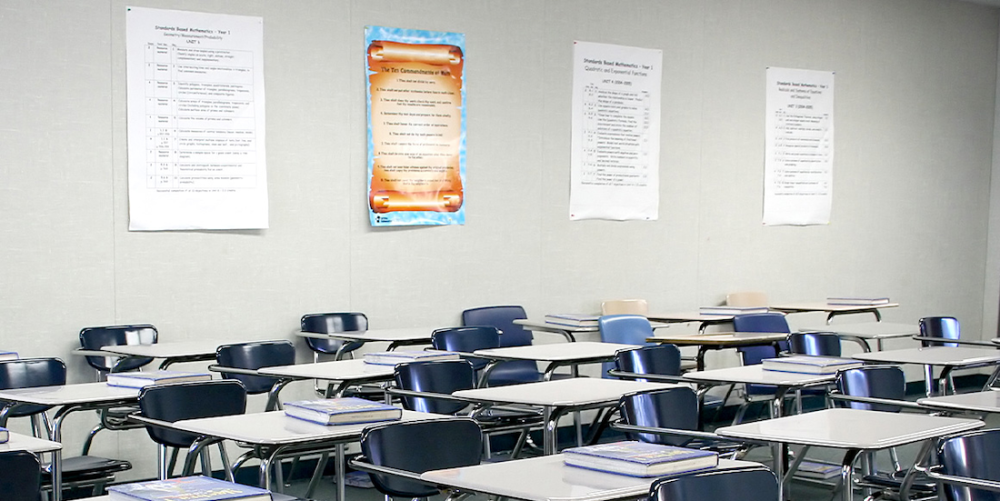
State becomes largest to require biblical texts in public schools amid legal challenges nationwide

New York, N.Y. – Texas has become the nation’s largest state to mandate the display of the Ten Commandments in all public school classrooms.
This follows Governor Greg Abbott‘s signing of controversial legislation that critics say violates constitutional principles of church-state separation.
The new law requires public schools across the state to post a specific 16-by-20-inch poster or framed copy of the Ten Commandments in every classroom, affecting nearly 6 million students in approximately 9,100 public schools statewide.
The mandate specifies a particular English version of the biblical text, despite variations in translations and interpretations across different denominations, faiths, and languages.
This would be the King James Version (KJV) of the Bible’s Old and New Testaments. However, Catholics rarely use this version, and many Protestant denominations also prefer other translations.
Nearly six million students in approximately 9,100 public schools statewide affected.
Republican Leadership Champions Historical Significance
“The focus of this bill is to look at what is historically important to our nation educationally and judicially,” said Republican state representative Candy Noble, a co-sponsor of the legislation, during House proceedings. The measure passed easily through the Republican-controlled state House and Senate during the legislative session that concluded June 2.
Supporters argue that the Ten Commandments represent a foundational element of the United States’ judicial and educational systems, justifying their prominent display in public educational spaces. The legislation aligns with Governor Abbott’s long-standing advocacy for religious displays in government settings.

Legal Precedent and Constitutional Challenges
Abbott’s support for Ten Commandments displays dates back to his tenure as state attorney general, when he successfully argued before the Supreme Court in 2005 that Texas could maintain a Ten Commandments monument on the state Capitol grounds. This legal victory established precedent that supporters hope will protect the new classroom mandate from constitutional challenges.
However, the Texas law faces significant legal headwinds following recent federal court rulings against similar measures in other states. A federal appeals court ruled Friday that Louisiana’s comparable law was unconstitutional, blocking its implementation. Arkansas also faces federal court challenges to its own Ten Commandments legislation.
Faith Leaders Express Divided Opinions

The legislation has created divisions within religious communities across Texas.
While some Christian leaders support the mandate, dozens of Christian and Jewish faith leaders signed a letter opposing the bill, arguing it infringes on religious freedom for students from diverse backgrounds.
“Texas has thousands of students of other faiths who might have no connection to the Ten Commandments,” the faith leaders noted in their opposition letter.
They emphasized that the mandate could alienate students from non-Christian backgrounds and create an uncomfortable learning environment for families with different religious traditions.
Broader Conservative Education Movement
The Ten Commandments requirement represents part of a broader conservative effort to integrate religious elements into public education. Texas lawmakers simultaneously passed complementary legislation allowing school districts to provide students and staff with daily voluntary prayer periods or time to read religious texts during school hours.
These measures reflect a nationwide trend primarily in conservative-led states to challenge traditional interpretations of church-state separation in public education. Supporters view these policies as restoring historical religious values to American schools, while opponents argue they impose specific religious beliefs on diverse student populations.
Implementation Timeline and Enforcement
The law will take effect at the beginning of the next school year, requiring districts to procure and install the specified Ten Commandments displays across all classroom spaces. School administrators must ensure compliance with the exact specifications outlined in the legislation, including the mandated size and English translation requirements.
Districts will need to allocate funding for the displays, though the legislation does not specify state funding mechanisms for implementation costs. The financial burden will likely fall on local school budgets already strained by various educational priorities and infrastructure needs.
Anticipated Legal Challenges
Legal experts anticipate swift challenges to the Texas law, particularly given recent federal court rulings against similar measures. The American Civil Liberties Union and other civil rights organizations have indicated their readiness to pursue litigation challenging the constitutionality of mandatory religious displays in public schools.
Louisiana’s State Attorney General Liz Murrell has pledged to appeal recent adverse rulings and take the issue to the U.S. Supreme Court if necessary. Texas officials may similarly pursue appellate strategies if lower courts block implementation of their mandate.
The legal battle over Ten Commandments displays in public schools represents a significant test of current Supreme Court interpretation of the First Amendment’s Establishment Clause and the boundaries of permissible religious expression in government-funded educational institutions.